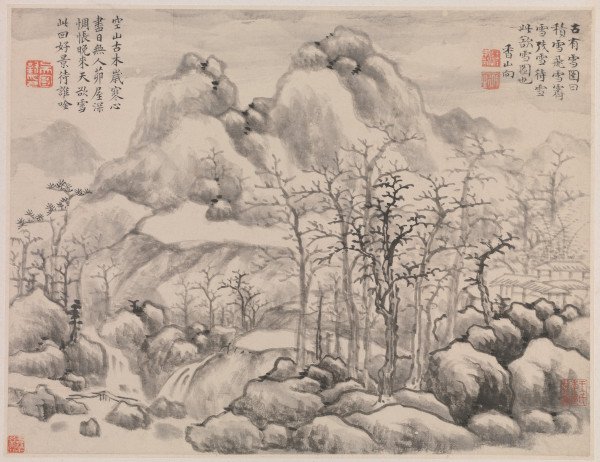
Winter Wellness
Winter is characterized by the Chinese word cáng 藏 which means “to store/conceal/hide.” It’s the time for hiding out and laying low. Nature is dormant and hibernating. Yin is dominant and at its peak. Yang is completely concealed, hidden inside. Winter corresponds to the Water phase (shuǐ 水) and the kidneys.
It is also recommended that one does not overexert oneself. It’s good to exercise, but not to the point of excess where one is pouring sweat. Foods, medicines, and therapies such as sauna that promote excessive sweating are not recommended at this time as too much yang qi can be lost. It is best to moderate sexual activity in relation to what may be normal in the spring or summer seasons. It is natural to sleep a bit extra during the winter, going to bed early and rising later after the sun has come up.
Chinese health theory promotes the idea that it is best to cover up and keep the body warm in the winter. We want enough clothes to keep warm, but not so many layers that we begin to sweat. The idea of guarding against cold is deeply rooted in Chinese culture. Warmth is yang, it is activity, motion, life. The absence of yang gives way to qualities associated with yin: cold, motionlessness, death. Of two very commonly used Chinese words for pain, tong 痛 and teng 疼, we see that teng contains the character for winter (dong 冬). The classics of Chinese medicine are filled with associations of pain and disease to cold. In the Plain Questions, the chapter titled “Treatise on Pain” contains ten or so examples of pain, all of which (except one) are considered to have cold as their cause. The Plain Questions states directly, “The presence of cold causes pain.”
Keeping warm in winter would seem like common sense, however, it is not uncommon to see westerners out braving the cold with inadequate clothing, even on very cold days. Afterall, temporary exposure to cold is a fairly moderate discomfort, but it may open us up to imbalances and create more of a strain on our bodies than we realize. On a very practical level, when the body gets cold, blood retreats from the limbs inward to protect the organs, leaving reduced blood flow to the limbs. An overall state of smooth circulation is ideal for optimal immunity, so it is best to keep warm in order to maintain that physiological state.
In winter we want to nourish our yang qi and allow it the opportunity to recuperate, lest our organs become deficient in yang, which among other things, the very important function of digestion relies on. Additionally, because yang qi has retreated from the surface to the interior, there is also risk of developing excessive internal heat. There is a folk saying, “In winter eat radishes, in summer eat ginger.” Radishes are a cooling food and ginger is warming, so at first it may seem backwards, but the idea here is that in the summer yang qi moves to the exterior and thus it is necessary to warm the interior, whereas in the winter yang qi moves to the interior and so we can eat a bit of cooling foods to seek balance. The water phase is associated with salty flavored foods, but we don’t want to promote the water phase so much that it overpowers the fire phase, associated with the heart. So it is best to eat more bitter flavored foods that nourish heart qi as a preventative measure.
For practitioners of energy arts such as qigong/neigong, it is especially important, as always, to make sure to stay warm and cover up immediately after practice when the surface layer of our body is relaxed and open, making it easier for pathogenic cold and damp to enter.
It is also widely acknowledged that winter, especially the few weeks surrounding the winter solstice (dong zhi 冬至), are an optimal time to meditate, as this is the “midnight” of the annual cycle, corresponding to the Fu Hexagram ䷗ where a single yang (solid line) is beneath five yin (broken lines). At this climax of yin, yang will naturally arise and meditating at this time can be very helpful, especially for practitioners of Daoist alchemy. There’s a saying, “冬至练一天,平时练半年” meaning, “a day of practice on the winter solstice is like a half year of practice during normal times.”
Correspondences
Yin (Zang) Organ: Kidneys
Yang (Fu) Organ: Bladder
Direction: North
Color: Black
Flavor: Salty
Climate: Cold
Orientation: Downward
Sense Organ: Ears
Tissue: Bones
Positive Emotion: Wisdom (zhi 智)
Negative Emotion: Fear (kong 恐)
Recommended Foods
| Vegetables | Fruit |
| Chinese yam (shan yao 山药) Root Vegetables Carrot Mushroom Garlic Radish Scallion Fennel Leek Asparagus Cooked cabbage Potato | Apple Hawthorn Grapes Tangerine Mulberry Pomelo |
| Protein | Carbohydrates |
| Lamb Beef Venison Walnut Black sesame Pine nuts Sunflower seed Hemp seed Bone broth Black soybean | Black rice Purple rice Glutinous rice Glutinous millet Porridge (may include the above) Whole wheat flour Rye bread |
| Other | Eat Less |
| Ginger Alcohol Wine Black tea Spices Miso Goji berries Turmeric Black pepper Cordyceps Longan Red dates | Iced or cold beverages Cold or raw foods Don’t overdue it with baked foods/flour products |
Featured image: Snowscape, from Album for Zhou Lianggong by Yun Xiang (1645-55)
1. Fruehauf, H., Dharmananda, S., 2010: Promoting Health During the Four Seasons, http://www.itmonline.org/articles/four_seasons/four_seasons.html2. Lihong, L., 2019: Classical Chinese Medicine. The Chinese University of Hong Kong Press.

